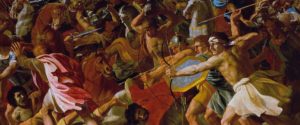Unbiblical Church of God Traditions that Hinder Church Growth
1. The Sunday sermon.
The Bible doesn’t teach us to go to church on Sunday and listen to one man preach a sermon. On one occasion, Paul taught (or dialogued) with the people all night in Troas. Was that a church? His ministry group? THe word there can apply to interactive discussion. He was an apostle teaching his knowledge of the Gospel. He didn’t teach that local churches were to assign one man to preach a sermon.
We have one lengthy chapter on what to do in church meetings as far as the ministry of the word is concerned. It is I Corinthians 14. Verse 26 shows us the assumed type of church meeting Paul was giving instructions about. A meeting where ‘every one of you hath a psalm, hath a doctrine, hath a tongue, hath a revelation, hath an interpretation.’
Did Paul say ‘sit down and shut up and let the anointed preacher speak.’ No. He said, “Let all things be done unto edifying.” So the speakers here are members of the body, and they are to edify one another in church meetings using their gifts.
Paul goes on to give specific instructions for speaking in tongues, that tongues spoken in church are to be interpreted or let the speaker keep silent in the church. He gives instructions for prophets to prophesy, including an instruction that one is to hold his peace if another receive a revelation. Paul also teaches that ye may all prophesy one by one. Earlier in the chapter, he presented a positive example of all prophesying and an uninstructed person or unbeliever coming in, hearing the secrets of his heart, and saying God is truly among you. This passage encourages prophesying in church. It is a lot more ‘charismatic’ or ‘Pentecostal’ than most Pentecostal denominations are with their meetings.
Paul also called his instructions in the passage ‘commandments of the Lord’ and implied that they applied universally to churches. The word hadn’t originated with Corinth or only come to them. They weren’t allowed to change the rules for church meetings.
Hebrews 10:24-25, the prooftext used to tell people to go to church tells them what to do in the assembly, ‘Exhort one another.’
God has chosen the foolishness of preaching to save them that believe. That refers to unbelievers hearing preaching (evangelistic proclomation), believing, and getting saved through it. It doesn’t mean the already saved get saved through hearing a certain kind of oratry every week.
2. The Modern Pastor Role.
The modern pastor role and duties doesn’t exactly correspond with anything in the New Testament. The Bible never says the apostles appointed ‘the pastor’ over the local church. In the 1800’s, letters to Timothy and Titus came to be called ‘the pastorals.’ There is a Roman Catholic tradition that Timothy later became a ‘bishop’. But Paul refers to him and Silas and himself as ‘apostles of Christ’ in I Thessalonians 2. He tells him to do the work of an evangelist and doesn’t call him ‘the pastor.’
Traditionally, clergymen were called ‘priests.’ ‘Priest’ comes from the Greek word for elder, ‘presbuteros.’ The apostles appointed elders in every church, we read in Acts 15. That tells us that churchs can exist without elders. It also tells us that they appointed local men from within the very congregations they planted. The appointed more than one of them. Acts 20:28 shows us that Paul told elders of the church in Ephesus to pastor the church of God. He also called them bishops. I Peter 5 tells elders to pastor the flock of God.
So we see a difference, with the local pastor being brought in and hired as opposed to being raised up locally (which may happen rarely under the current system.) The current system makes the pastor the sermon-preacher every week, a tradition not taught in scripture. The Bible leads us to believe there were many teachers in a given church, or should be as a church matured (see the end of Hebrews 5). The elder/bishop was requried to be apt to teach. That doesn’t mean only elders could do so.
Elders of the church are to be examples to the flock. As the Lord’s undershepherds, they should encourage obedience to the word of God. I Peter 4 shows us that using spiritual gifts to minister to one another is a stewardship issue, including gifts that include speaking to others. That means believers are required to use their gifts. As pastors, the elders of the church should encourage believers to be obedient and use their gifts, including using their gifts in church in accordance with the teaching of scripture. Elders should use their own gifts as examples to the flock, modeling good stewardship so that others can follow the example.
3. Obession with church buildings.
The Jerusalem church met in the temple and from house to house. Churches among the Gentiles, in scripture, met primarily in homes: the church in the house of Aquilla and Pricilla, the church in the house of Nympha, the church in Philemon’s house.
When church planters and churches are freed from the traditional, unscriptural ideas about church meetings, the roles of clergy, and obsession with church buildings, then this can go a long way in helping churches grow and reproduce.



Comments